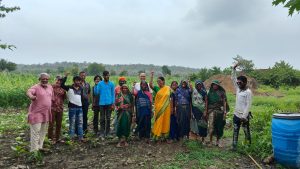Constructing climate-friendly, healthy food systems that are good for the planet and people remains one of humanity’s great challenges.

Mahila Jagat Lihaaz Samiti (MAJLIS) with tribal families. Madhya Pradesh, India. Taken by: Sayali Dongare
The ‘modern’ food systems put in place over the past century – with many technologies and trade rules imposed in colonial fashion – have taken a toll on ecosystems, nutrition, income and rights protections of smallholder farmers and Indigenous peoples. Peer-reviewed research assigns approximately 33 percent of greenhouse gas emissions to industrial agriculture, meaning that, without a radical reshaping of food systems, we are unlikely to stabilize the Earth’s climate.
Currently less than two percent of global philanthropic giving goes toward climate mitigation and only three percent of all climate finance is allocated to food systems, an even smaller fraction to farmer, fisher or Indigenous-led organizations. Robust scientific and case studies show how agroecology-based food systems contribute to climate change mitigation, adaptation, and resilience.
Multiple lines of evidence converge and demonstrate that success factors for increased resilience are not only the reliance on ecological principles but, importantly, on the social aspects, and in particular on the co-creation and sharing of knowledge and traditions that lead to improved climate change adaptive capacity.
A Call for Increased Climate and Food Systems Transformation Funding
As the world faces a polycrisis – increased hunger, loss of biodiversity, and climate related disasters – it’s imperative that we see a massive increase in financial investments in climate and food systems transformation. A global transition to regenerative and agroecological approaches can support a cascade of positive outcomes from stable yields, crop resilience and higher incomes for farmers, fishers, and food producers to improved nutrition and food security and enhanced biodiversity.
In December 2023, at the launch of COP28, the Agroecology Fund along with 25 leading philanthropies issued a joint call for a tenfold increase in funding for regenerative and agroecological transitions to address urgent global agricultural and environmental challenges. These philanthropies aligned around a shared ambition to catalyze a transition to 50 percent regenerative and agroecological systems by 2040, and to ensure all agriculture and food systems are transitioning by 2050.
However, it is not enough to shift financial flows; supporting participatory, democratic, local governance of funding and financing are critical to ensuring current and historic uneven power dynamics aren’t replicated.
Those closest to the impacts of the climate crisis have the solutions that are right for their communities and demonstrate how to move agroecological food systems forward. That’s why in addition to a global fund, the Agroecology Fund is incubating four regional funds. A territorial approach to change is required for true global transformation to occur, and that’s not possible without deeper funding of grassroots movements.
The Agroecology Fund works to strengthen relationships among a diverse pool of funders – now over 50 – to respond to the creativity and needs of grassroots agroecology movements. With increased interest from funders in supporting participatory models of grantmaking to invest in climate solutions at local levels, the fund has been able to significantly expand their network of support for collaboratives around the world.
But it can’t just be about mobilizing philanthropic funding – it will never be enough and it cannot be held publicly accountable. That is why we collaborate with bilateral and multilateral agencies as well as governments and private investors through mechanisms like the Agroecology Coalition. We aim to constantly remind donors and investors that their funding ought to be deployed for climate solutions at the grassroots and territorial levels.
Deepening Grassroots Movements
In late 2023, Waverley Street Foundation and Agroecology Fund partnered to support collaborative research and advocacy among agroecology and climate justice networks and, through them, among farmers, scientists (biophysical and social), consumer groups, and policymakers, to explore how to strengthen an enabling policy environment to scale up agroecology as a climate solution. This $16M investment shifts major funding into grassroots and climate advocacy collaboratives.
This partnership builds on learnings and momentum from an eight country Latin American and Caribbean participatory action research initiative supported by Canada’s International Development Research Centre. The resources provided by the Waverley Street Foundation initiative deepen the Agroecology Fund’s capacity for decentralized, trust-based grantmaking and extends the participatory action research methodology to Agroecology Fund partners in Asia (India and Indonesia), Africa (Ethiopia, Kenya, Nigeria and South Africa), Americas (Argentina, Brazil, Colombia, Mexico and USA) and Europe (France), building on successes and momentum.
Certainly, a burning question we all ask ourselves in these times of crises is how do we design and implement public policies for truly climate resilient food systems? This initiative is unprecedented in its size, scope and methodology. The iterated process of participatory action research and advocacy will also contribute to strengthening the agency of civil society in food systems governance and can catalyze transformative shifts in public budgets.
A Call for Support
The Agroecology Fund continues to strengthen relationships among a diverse pool of funders to respond to the creativity and needs of agroecology movements. The recent spike in interest and investment from major philanthropies is immensely hopeful, as is the deepening collaboration with other public and private investors.
The world sits in a precarious place, and deepening investments in grassroots movements that build truly just and sustainable food systems is essential. We call on the greater climate philanthropy community to seize this moment and dramatically increase funding of grassroots movements whose work is rooted in research and learning processes that result in effective solutions for local contexts. Without funding frontline communities, we fear that our efforts to build climate resilient food systems will be thwarted.
Daniel Moss is the Co-Director of The Agroecology Fund






Comments (0)